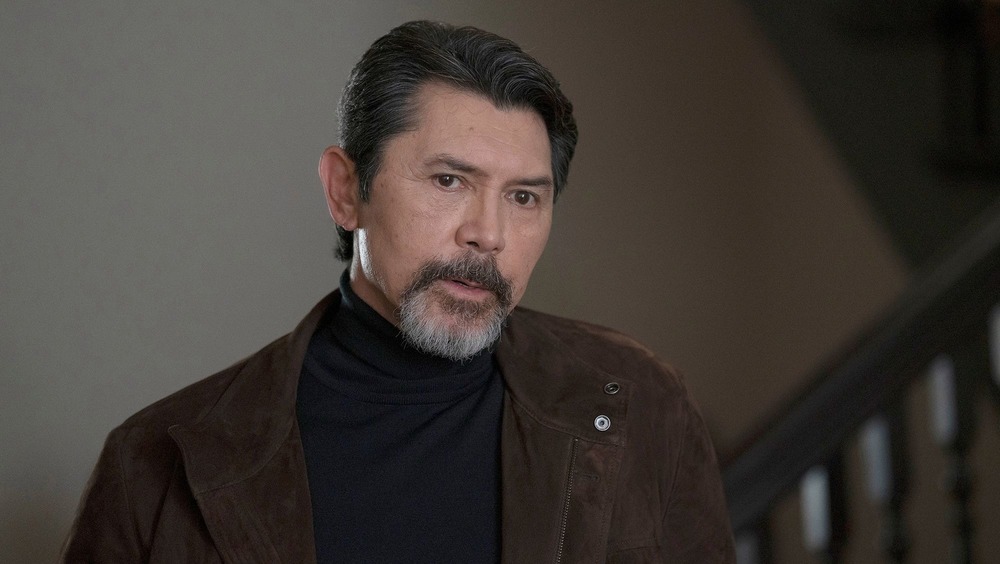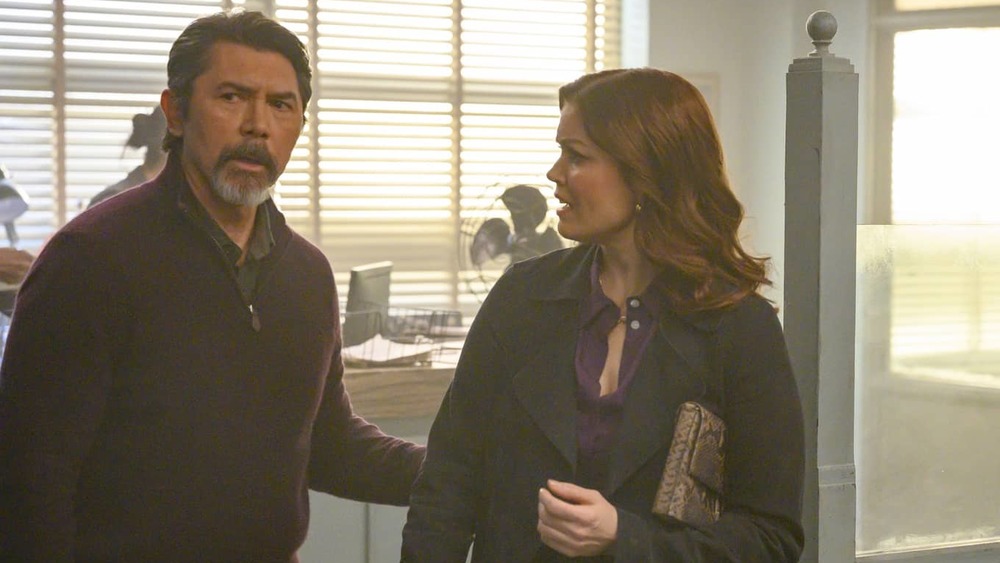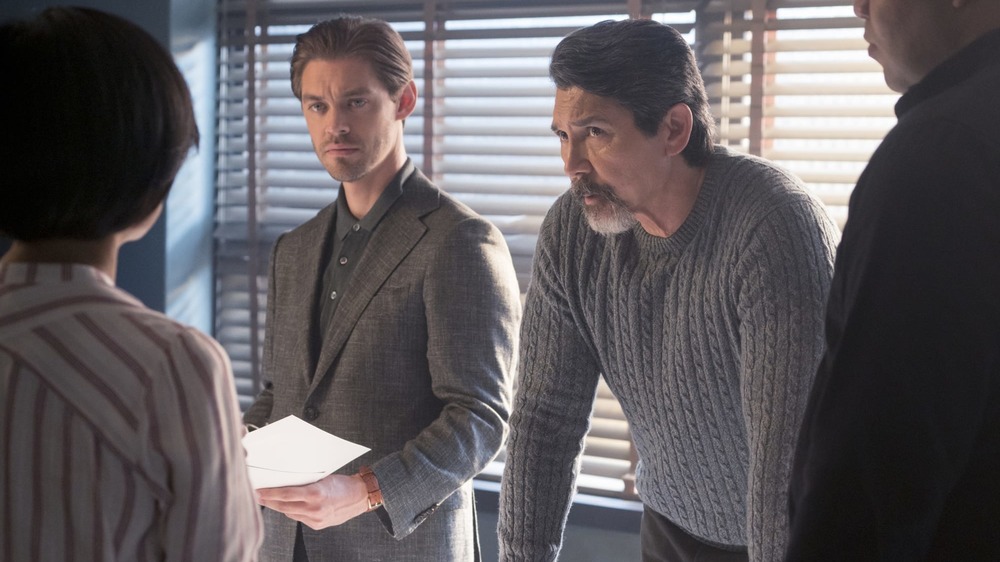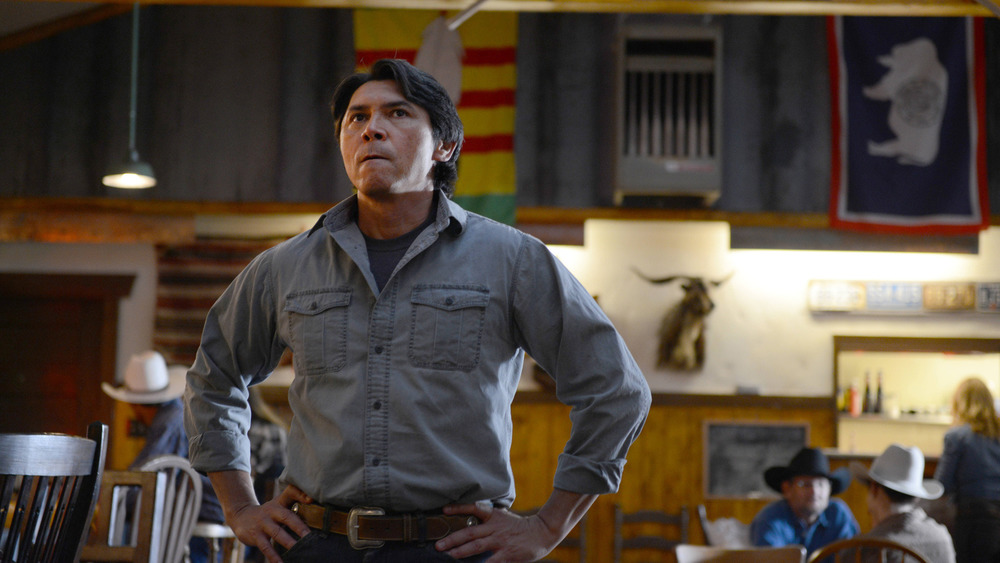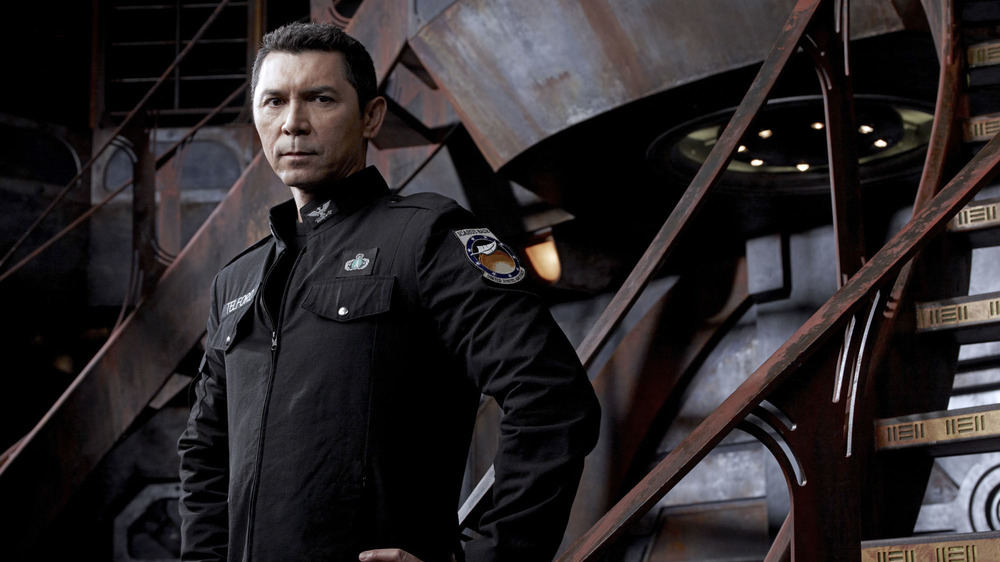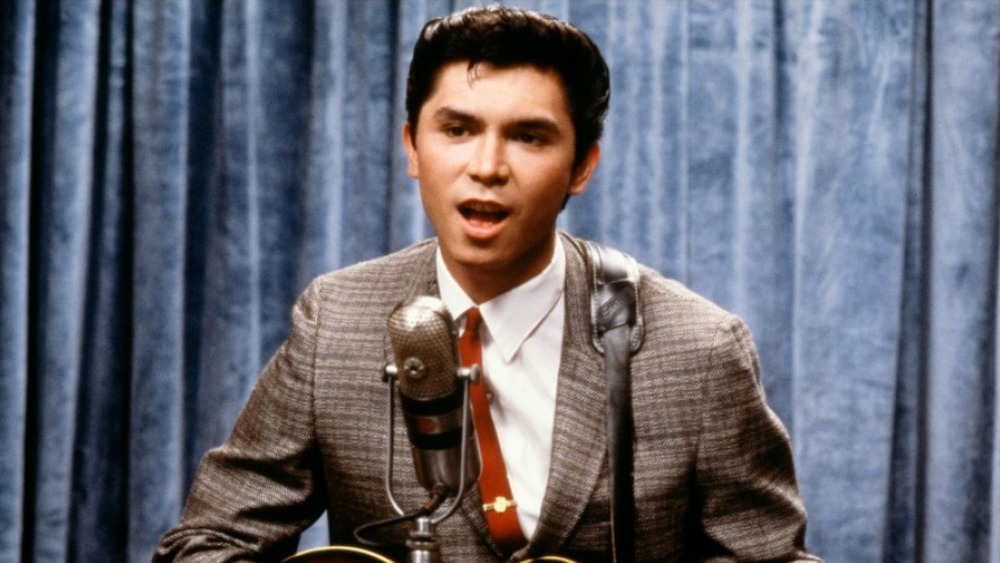Lou Diamond Phillips On Prodigal Son, His Most Popular Roles And More - Exclusive Interview
We may receive a commission on purchases made from links.
After more than 35 years, Lou Diamond Phillips' diverse and consistently active career shows no signs of slowing down. He's currently starring on the Fox crime drama Prodigal Son, which revolves around the relationship between convicted serial killer Dr. Martin Whitly (Michael Sheen) and his son Malcolm (Tom Payne) and daughter Ainsley (Halston Sage), both of whom show signs of inheriting their father's madness.
Phillips plays NYPD lieutenant Gil Arroyo, who has recruited Malcolm, a onetime FBI profiler, as a consultant to the major crimes unit. In the recently launched second season, Arroyo is recovering from a stab wound while drawing closer to Dr. Whitly's wife Jessica (Bellamy Young). The hybrid police procedural and psychological drama has garnered acclaim from fans and critics, with RogerEbert.com proclaiming it "a solid mystery/drama" that "plays on our increasing obsession with serial killers and grisly murders with an engaging, talented ensemble."
Phillips began acting in 1984 and landed his big breakout role three years later, playing Chicano rock and roll pioneer Ritchie Valens in the biopic La Bamba. Since then, he's had featured roles in hit movies like Stand and Deliver, the Western Young Guns and its sequel, and Courage Under Fire, along with scores of guest and regular roles on TV series such as Miami Vice, Numb3rs, Stargate Universe, Longmire and many more.
With his first novel published in 2020 and a directing credit coming up on Prodigal Son, Phillips spoke with Looper in an exclusive interview about his thoughts on the show, taking a turn behind the camera, and which of his many roles remain among the most popular with the public.
How Prodigal Son exceeds his expectations
What do you think surprised you the most about this show, and also about the character of Gil, when you initially took this on?
The pilot script set the bar so high, and Lee Toland Krieger directed it with such aplomb and panache. It was like, are we going to be able to keep this up? You see so many shows where they do a lot of crazy, cool things and spend a lot of money on the pilot, and then the quality of the show just gradually goes down. Ours hasn't. Ours has gone up, if anything. They have kept up that level of ingenuity and ingeniousness. The crimes of the week continue to be jaw-dropping and entertaining. I read every script aloud with my wife and we laugh through it. We're like, "Oh my gosh, we're going to do that."
It's so exciting, but the relationships — which I think are ultimately the backbone of any successful television show — have only gotten deeper and the characters have gotten more complex. They never do things in broad strokes. It's always very specific. We've all been able to grow into our characters because the writers have paid attention and write to our strengths.
As a result, in the second season, not everything is completely on Malcolm Bright's shoulders. The planets that revolve around his sun, as it were, are being dealt with individually and specifically. The dynamics between me and my team are getting investigated a little bit more. Ainsley gets to step up quite a bit, you know — Halston Sage in that jaw-dropping finale. That storyline is going to be examined a bit more, and her character, and what is in her DNA. That's a very interesting subject to follow up on, and how does that affect Malcolm?
Gil's relationship not only with this team but with that rekindling of the relationship he had with Jessica — they don't put any little bow on that. It's messy, as messy as the stab wound to my gut. That in and of itself comes with its own set of baggage. How are we going to deal with that, and how does that affect Malcolm? How does that affect my team? How does that affect Gil's ability to be objective and the law-abiding rock that he is?
You almost anticipated my next question. I know you don't want to spoil anything about how the relationships are developing — particularly Gil and Malcolm, Gil and Jessica, Gil and Ainsley — but it's interesting to hear that.
It's true, and it's so much fun because they don't rest on their laurels. They don't let anything get stale. Every episode that pursues a storyline just digs deeper into that can of worms. It's not only fun for the writers, it's fun for us. This is only our second season. You see it on certain television shows where it's becoming rote, it's becoming practiced, and our guys won't let that happen. They shake it up almost every episode.
A new spin on an old favorite
The show definitely puts a new twist on the police procedural genre. How do you keep that fresh on a show like this?
The show from the beginning, to me, was a hybrid. It's like, well, it's a police procedural, but it's also a serial killer show, so there are horrific aspects to it. It's a psychological thriller along the lines of Seven or something like that, or Hannibal or Silence of the Lambs. And it's This Is Us (laughs). It's a family drama with murder. It's got all of those things. Was it going to fail on so many different levels or fail at one and not the other? They've managed to walk that tightrope and succeed in all of those different categories.
And then the humor of it — early on, I said to the guys, "It's got this wonderful black humor that we've come to love in shows like Breaking Bad or Killing Eve or Better Call Saul," and they've managed to keep it with that really edgy black humor without getting too tongue-in-cheek and winking at the audience. That would really defeat the purpose. That would be far too self-conscious.
It's that hybrid nature that keeps it moving. It's clicking on all cylinders as far as the crime goes, in that it's believable and yet macabre, it hits on the stranger-than-fiction aspect of crime in America today, with our fascination with serial killing or with what really happened in certain crimes and true-life crime dramas. There's a lot that the guys can do. If it's not working in one direction, they'll go in the other and yet maintain a balance of it. Now that I'm directing one, I see the need to keep all those balls in the air and not just lean too heavily into one and not the other.
You're directing an episode of Prodigal Son this season. You've directed before, on Fear the Walking Dead, Agents of S.H.I.E.L.D., Longmire and others. What's your approach to directing this show, and is this something that you want to keep exploring?
Yeah. I directed my first film that I co-wrote back in 1990 (Dangerous Touch) and I've been a member of the DGA since '97. It's like me writing a novel, to be honest. It's something that I love doing but that I don't do a lot because my day job worked out okay. I keep getting asked to dance as an actor, which obviously I'm very grateful for, but I am leaning into directing more these days. I'd love to be Eastwood and doing it when I'm 80 — when I can't do stunts anymore and I'm not the love interest and I really don't care what I look like [laughs]. It has to be a challenge for me. I have to love it because it's too hard to do if you don't. You don't want to take on a project that you're so-so about.
Interestingly enough, Prodigal Son is very, very much in the vein of what I've done lately, which is somewhat genre, but not. When you go from Longmire, which is a Western, to Fear the Walking Dead, which is just horror and had a very, very specific — in that season — visual approach, to the sci-fi aspect of Agents of S.H.I.E.L.D. and the action aspect of it, Prodigal Son brings together a lot of that. And what I love about Prodigal Son is it's not your typical procedural in how we do it, in how we shoot it.
Expanding his horizons
You recently published your first novel, The Tinderbox: Soldier of Indira. A longstanding dream of yours?
I wrote my first novel, which was really, really, really terrible, in high school. That's one I'll never go back to. It was a Stephen King rip-off because I was a massive King fan in high school. Still am. I wrote another one in college, which is worth going back and taking a look at. But this novel came about in a very circuitous fashion.
When my wife Yvonne and I first started dating, she was reading some of my writing, some of my screenplays, and actually the novel I wrote in college. She was showing me her artwork and she had done these amazing sketches in the manga style that were going to be a graphic novel adaptation of Hans Christian Andersen's The Tinderbox. Immediately in my storyteller's mind, it was like, wow, this is a post-apocalyptic feudal kingdom story, and I told her. I said, "We should do a movie." She went, "Okay." She's also a sci-fi nerd when it comes to what she likes in movies, so I thought, well, we'll set it in outer space, do a Star Wars ripoff and create our own galaxy far, far away.
When I finished writing the screenplay, it was like, nobody's going to let me direct this. So we decided to go ahead and create the novel and to flesh out that whole world. As a result, I would have to go back and really do some work on the screenplay because the novel became a thing of its own. Once again, like the directing and everything else, it's something I did sporadically because I always had a gig, thank God.
So it took about 10 years to get the first draft completed, but then it sold last November and I took another year basically to do the final edits and to take the notes from the editor and from my agent and from the publisher and whatnot. In a weird way, silver lining-wise, COVID helped out because then I wasn't acting anymore. My day gig was not a possibility, so I could sit at home and really, really focus on the fine-tuning of the novel. Yvonne had 30 illustrations that she could work on during that time as well. Fortunately, that became the blessing in disguise for us.
What's the response been like?
I was blown away, man, blown away by the response. The reviews were so wonderful. People fell in love with this world and these characters. We were in the top spot on the Amazon lists in a couple of different categories, YA and sci-fi and space opera. I thought, "Oh, okay. It's a space opera too." The response was so good that I'm working on the sequel already. Literally taking the notepad and the computer to set with me at times. Once again, Yvonne came up with the idea. We started talking about, "Oh, let's do a sequel," and had left it open to that at the end of the first novel. I thought it was going to go in one direction. Yvonne came up with an idea that is so out of left field that I thought, "That's it. That's it." It will be a surprise and not a retread in the least. It will advance the story in a very logical and I think very authentic way.
Aborted missions
You were involved with Stargate for a couple of seasons on Stargate Universe. There's still a big groundswell of fans for those shows. Would you be interested in going back to that role?
I loved that role. The thing about it is, they pulled the rug out from under us. They found out halfway through season 2 that it was not going to be renewed. They had a five-year plan, like most TV series do, and they had to cobble together as satisfying an ending as possible.
What I find really ironic is that Stargate Universe tried to be different, it tried to be its own thing in the Stargate universe, even though we had crossover actors from SG-1 and Atlantis as well. But because it was different, there was a little bit of backlash from the fans. It was, "Oh, this isn't Stargate. This is something new. This is more like Battlestar Galactica." All the chat rooms were filled with that sort of thing until we got canceled. Then everybody's like, "No, no, no, don't cancel it. We want to pick on it." In hindsight, people have learned to take SGU for what it was, and I think it gained a little more love in retrospect. Brad (Wright) writes wonderfully. He's a fantastic, great guy to work with. I love that cast. I'm still pretty tight with a lot of them.
So yeah, in this day and age of reboots and multi-platforms and everything else, who knows what could come about? Even the reunion world, one-offs and stuff like that, people are very, very hungry for. I never discount anything, to be quite honest.
Your breakout role was, of course, La Bamba. Is there a musical artist that you admire now that you would want to produce, act in, or direct a biopic about?
Interestingly enough, they came to me last year to potentially direct and write, or do the last pass on, a biopic that's going into production very soon. It was ascertained early on, unfortunately, that with my television schedule it just wasn't going to be possible. We just couldn't squeeze it in. That I would do in a heartbeat, only because it's so rich — those rags-to-riches stories, the stories of artists so compelled to follow their hearts that they become stars, and we've seen great success with them.
Rami Malek's performance of Freddie (Mercury) was iconic. I was just talking about Taron Egerton (in Rocketman) the other day. I thought he was overlooked. I really felt as if he deserved a nomination but the film came out in the summer, so people forgot about it. I thought that was actually a more successful biopic than the one on Freddie. I thought it was more original and more unique in its take, bringing the Broadway musical world into it.
There are still a lot of people. It's funny because way back in the late '80s, I was briefly attached to a Jim Croce project where I would have done my own singing. I thought, great, am I going to be the guy who plays people who go down in planes? I don't know. There's quite a few that I think are ripe for the biopic treatment.
Tom Payne turned around in the dressing room the other day, or in the makeup room, I should say. I don't know what it was — he didn't get much sleep or something and his hair was messed up. All of a sudden, I realized, "Oh my God. You could play Mick Jagger." He's like, "Oh, I'd be interested in that. Sure. Why not?"
Lou on almost joining The X-Files and his legacy roles
You almost got onto The X-Files toward the end of that show, in the John Doggett role. What happened there and what do you think you would have brought to the show?
The final three for the Doggett role on The X-Files were me, Bruce Campbell, and obviously Robert Patrick, who got the gig, and rightfully so. Fantastic. Love him. Speaks "federal" a little bit more than I do, even though I did do that wonderful federal sniper guy on Numb3rs for a while. In a weird way, I think that one of the reasons Robert got the role is that he didn't come with as much baggage as, say, Bruce and I do. People see us onscreen and they all of a sudden make certain assumptions, or their mind wanders. Whereas I think Robert, as far as (Terminator 2: Judgment Day) goes, was a little bit more of a blank slate, which I think was necessary to the aesthetic of that show. I tend to be a little bit more character-y. I bring a little more spice to it, so to speak.
What's the role you get asked about most when you meet fans? You're different characters to different generations, I would think.
Well, that's exactly it. As far as a lot of the roles go, sometimes it's regional. La Bamba, obviously, that was such a touchstone. The fact that it is still relevant and still speaks to a new audience — I think it was just put back into rotation on Netflix last fall, so an entire generation that hadn't seen it gets to see it again. It's still fresh and it's still new. It didn't feel like a trendy '80s movie. It's timeless in that respect. A lot of people still identify with that.
Throughout the South and Southwest, where I shot Longmire, Young Guns is the thing. A lot of guys my age and a little bit younger looked up to the Regulators. That was such a moment in history, to have all of us together in one film. Henry Standing Bear from Longmire is very much loved. There's a massive audience base out there for that. I'm just fortunate that so many of the roles have spoken to different people and that I wasn't a one-hit wonder.
This interview has been edited for length and clarity. Prodigal Son airs Tuesday nights on Fox.
